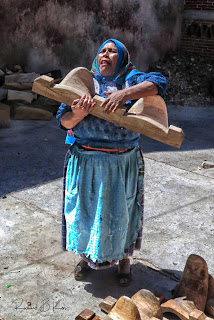Arnulfo Morales
Hernandez is a yoke maker. He is the only remaining craftsman in San Bartolomé
Quialana that makes wooden yokes for the teams of Brahma bulls that plow the
steep hillsides surrounding the pueblo. He also makes the wooden plows that
turn over the earth for planting corn during the rainy season from May to
September. The rugged terrain makes plowing with a tractor difficult and
dangerous. Nearly everyone in San Bartolemé continues to work the land in the traditional
manner: with a team of Cebú and wooden plows (arados).
 |
| Arnulfo's Yokes |
Arnulfo has been
making yokes and arados for twenty-five years. He learned by watching some of
the older men in the pueblo (now retired) and then taught himself. It takes him
two to three days to make a yoke, depending on the size. They are made from
different types of hard wood and last up to twenty years. A larger yoke sells
for 1500 pesos ($75 US). The wood costs Arnulfo 500 pesos, leaving a net profit of 1000
pesos ($50 US).
 |
| Cebú for sale at Ocotlán Market |
The smaller yokes
are used for training young Cebú to work the land. Arnulfo explained that it is
much like breaking a horse. The Cebú are strong animals and put up much
resistance to having the yokes put on them. Much care must be used in
harnessing them as they can get very angry and react wildly, endangering the
person trying to train them. However once they are trained, they are very easy
to work with. “Ya, uno no va adelante, ellos van solos” (Then you don't have to lead them anymore; they go by themselves). The campesino guides
the plow and the Cebú do the rest. Each animal has a name that they recognize.
If for some reason they stop plowing, all you have to do is call their name and
they start working again. They know their job well.
 Arnulfo does not
think his trade is in danger of dying out in the near future. People in San
Bartolomé respect the traditional ways of doing things, and tractors are not of
much use due to the terrain. His son-in-law is working with him now and perhaps
will decide to stay in the yoke business. “It is honest work that brings food
to the table”, he told me. There are few schools nearby by, and for those who
do well in school, there are more options for employment. Those who do not fare
well in school work the land.
Arnulfo does not
think his trade is in danger of dying out in the near future. People in San
Bartolomé respect the traditional ways of doing things, and tractors are not of
much use due to the terrain. His son-in-law is working with him now and perhaps
will decide to stay in the yoke business. “It is honest work that brings food
to the table”, he told me. There are few schools nearby by, and for those who
do well in school, there are more options for employment. Those who do not fare
well in school work the land.
When I asked
Arnulfo what he liked most about his job, he answered: “Me encanta mi trabjajo.
Cada persona nace con algo, y yo nací para hacer yugos y arados. Uno necesita amar lo que hace para ser feliz”. (I love my work. Everyone is born with a
gift, and I was born to make yokes and plows. You need to love what you do in order
to be happy).
 |
| Arnulfo & his wife, Inés |
 |
| Arnulfo & Inés' daughter |
Arnulfo’s life
style is quite self-sustaining. He owns his house and the land he farms. The
demand for yokes and plows is consistent and he usually has sufficient work. His wife
makes tejate, a natural drink made from cacao, to sell in the market and also embroiders huilpiles. His
daughter is a flower vendor. Working together they make an honest living and
are able to remain in the place they call home. And in doing so, they maintain
the traditions of their ancestors and a simplicity of life that is a true
accomplishment in this day and age.

No comments:
Post a Comment